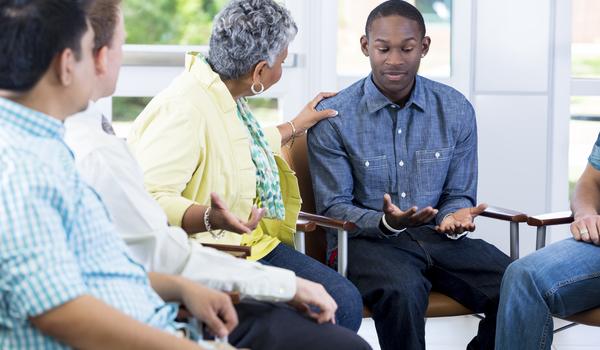Talking to others about living with and beyond cancer

Finding out that you have cancer is often overwhelming for you and for your friends and family. 1 You are the only person who can decide who you want to talk to about your diagnosis, and when.2
Here are a few things you may like to bear in mind when talking to family and friends, or when faced with the very difficult challenge of telling your child.
Why it is important to talk to others:
- Those close to you are may already be aware that something is wrong, and it is often best to tell them the truth rather than leave them guessing and imagining the worst2
- Your cancer may affect the life of those close to you, such as your partner3
- You may need practical support with daily activities3
- Sharing the burden with loved ones gives them a chance to offer support and may bring you closer together2
How to tell other people:
- Choose the right time and the right place to break the news: probably somewhere quiet4
- Introduce the subject gradually,4 for instance, by saying “You might have noticed I have not been myself recently”
- Talk to them in a way that suits you; you may find it easier to write a letter or even send an email than to talk face-to-face4
- If you feel too emotional to talk, it might be easier to ask someone you trust to pass on the news4
- You may consider asking one of your close friends to be your contact person; this contact person can be responsible for breaking the news; you may also ask them to post information on a personal webpage or blog, or to organise a phone chain so that you do not have to constantly update everyone1,5
Tips for preparing for the first conversation:
- Make a list of people you want to talk to6
- Think about your own feelings and what you expect from others when you tell them your news2
- Think about how much information and how many details you want to share, for instance: 6
- The type of cancer, the types of treatment you might need and your outlook
- What you would like from your support network
- Prepare yourself for a wide range of reactions from different people2
Talking to children:
- Always be open and honest with children7,8
- Do not keep secrets as they will guess that something is wrong and what they imagine may be worse than the reality7
- Give them simple explanations a small piece at a time, adjusting your message to the child’s age; perhaps tell a young child you have a pain in your tummy and the doctor is trying to make it better, but give an older child more specific details7,8
- Tell your child’s teachers, so that they can offer support at school7,8
- Encourage your child to express feelings in play or by drawing7,8
- Look online or in the library for books written for children and use these as a starting point for a conversation7,8
- A teenage child may find it easier to talk to friends or another relative or via a support group than to talk directly to you9